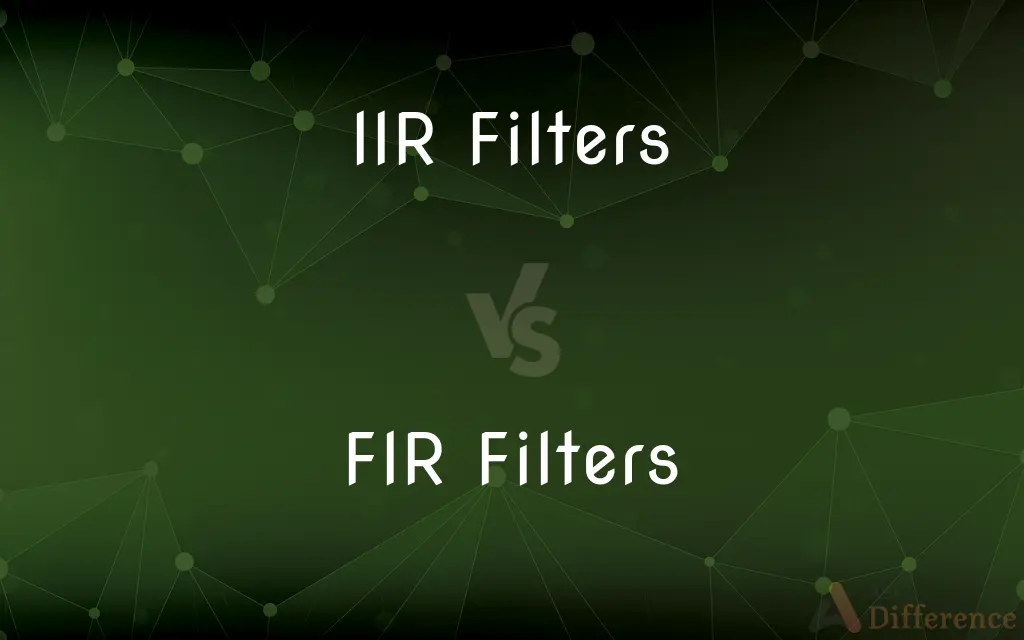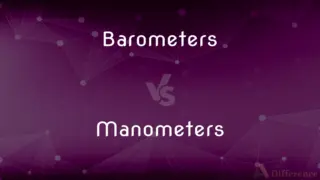IIR Filters vs. FIR Filters — What's the Difference?
By Tayyaba Rehman — Published on January 28, 2024
IIR (Infinite Impulse Response) filters use both past output and input for signal processing, while FIR (Finite Impulse Response) filters rely solely on input, offering inherent stability.

Difference Between IIR Filters and FIR Filters
Table of Contents
ADVERTISEMENT
Key Differences
IIR filters, characterized by their use of past output values in addition to current and past inputs, are known for their efficiency in complex filtering tasks. FIR filters operate only on present and past input values, not using previous outputs, which simplifies their structure.
An IIR filter can achieve a specific filtering effect with fewer calculations and less memory than an FIR filter, making it more efficient for certain applications. However, FIR filters, with their non-recursive nature, offer greater stability and are easier to design with a linear phase response.
In terms of implementation, IIR filters may require more careful design to ensure stability and avoid oscillations. FIR filters are inherently stable and can be designed to have a linear phase, which is important in applications like data communications and seismology.
IIR filters are often chosen for applications where computational resources are limited, as they can achieve sharp frequency cutoffs with a lower filter order. FIR filters are preferred in applications requiring exact phase linearity and where computational complexity is less of a concern.
The design of IIR filters is based on analog filter design techniques, making them suitable for applications emulating analog systems. FIR filters, with their inherent simplicity and stability, are more suited for digital systems where phase linearity is crucial.
ADVERTISEMENT
Comparison Chart
Basis of Operation
Use past input and output
Use only past and present input
Efficiency
More efficient, fewer calculations
Less efficient, more calculations
Stability
Can be unstable, needs careful design
Inherently stable
Phase Linearity
Phase linearity can be complex
Can be designed with linear phase
Typical Applications
Analog system emulation
Applications needing phase linearity
Compare with Definitions
IIR Filters
Known for their efficiency in complex filtering tasks.
The IIR filter provided the sharp cutoff we needed with minimal computation.
FIR Filters
Offers greater stability and easier design.
We chose an FIR filter for its inherent stability and ease of design.
IIR Filters
Can achieve specific effects with fewer calculations.
Our application’s limited memory made IIR filters an ideal choice.
FIR Filters
Suited for digital systems where phase linearity is essential.
For our digital audio system, the FIR filter's phase accuracy was a key advantage.
IIR Filters
May require careful design for stability.
Designing the IIR filter carefully was crucial to avoid oscillations.
FIR Filters
Typically requires more calculations than IIR filters.
Despite needing more calculations, the FIR filter met our precision requirements.
IIR Filters
Suitable for emulating analog systems in digital format.
For our analog system emulation, we opted for an IIR filter.
FIR Filters
Filters that rely solely on input values for signal processing.
The FIR filter’s reliance on input values made it stable for our application.
IIR Filters
Filters that use past output values for signal processing.
We used an IIR filter for efficient noise reduction in our audio system.
FIR Filters
Preferred for applications requiring exact phase linearity.
In our data communication system, the FIR filter’s phase linearity was crucial.
Common Curiosities
Why are FIR filters inherently stable?
They rely only on input values and do not use feedback loops.
Are FIR filters easy to implement?
Yes, due to their non-recursive nature and inherent stability.
What makes IIR filters more efficient than FIR filters?
IIR filters require fewer calculations due to their recursive nature.
Can IIR filters emulate analog filter characteristics?
Yes, IIR filters are often used for analog filter emulation.
Why are FIR filters preferred in digital communication systems?
Their linear phase response is crucial for data integrity in communication systems.
Do IIR filters need careful design to avoid instability?
Yes, their recursive nature requires careful design to ensure stability.
Are FIR filters more suitable for high-precision applications?
Yes, especially in applications where phase accuracy is critical.
Is the design of FIR filters more flexible?
Yes, FIR filters offer more flexibility in design, especially in phase response.
Do IIR filters typically require less memory than FIR filters?
Yes, due to their efficiency and lower order, they generally require less memory.
Can IIR filters be used for audio processing?
Yes, they are commonly used in audio processing for their efficiency.
Are IIR filters good for real-time processing?
Yes, especially in situations where computational efficiency is important.
Is it easier to adjust the frequency response of an FIR filter?
Yes, due to their straightforward design, adjusting the frequency response is simpler.
Can IIR filters cause oscillations in some cases?
Yes, if not designed properly, IIR filters can become unstable and oscillate.
Can FIR filters handle phase distortion better?
Yes, FIR filters can be designed to have a linear phase, avoiding phase distortion.
Are FIR filters commonly used in digital signal processing?
Yes, they are widely used in DSP for their stability and linear phase properties.
Share Your Discovery

Previous Comparison
Red Tape vs. Woodland
Next Comparison
Barometers vs. ManometersAuthor Spotlight
Written by
Tayyaba RehmanTayyaba Rehman is a distinguished writer, currently serving as a primary contributor to askdifference.com. As a researcher in semantics and etymology, Tayyaba's passion for the complexity of languages and their distinctions has found a perfect home on the platform. Tayyaba delves into the intricacies of language, distinguishing between commonly confused words and phrases, thereby providing clarity for readers worldwide.














































